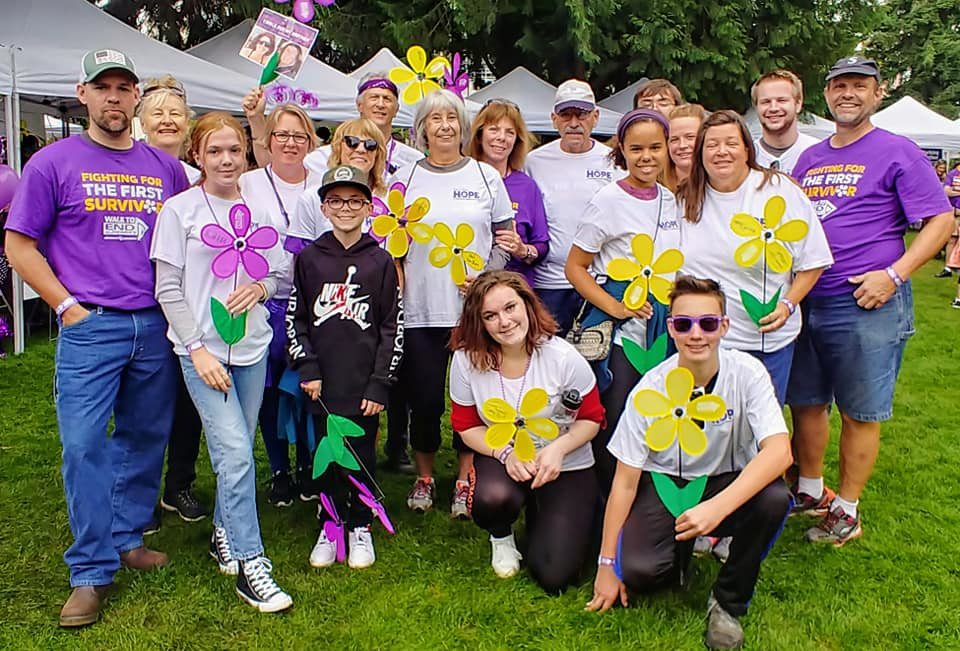
When Lynn Crawford’s husband died as a result of Lewy Body dementia, she turned her attention to supporting families and caregivers who needed more resources to care for loved ones with the disorder.
Crawford, executive director of HOPE Dementia Support Group, said she joined the nonprofit about five years ago after witnessing very few support groups in Clark County.
“Sometimes a person hears the diagnosis. And then, they don’t look at that person as a person anymore. They are somebody who has dementia,” Crawford said. “The goal is to reduce that stigma and improve the quality of life for individuals living in our community.”
HOPE implemented the national Dementia Friends program for Clark County this March. In a few months, over 130 people have attended an hour-long information session about dementia, Crawford said. Spokane County was the first in Washington to use the program over a year ago.
Participants receive a lapel pin and a yard sign after completion of the class.
As part of the program, Crawford reached out to several cities in the county to put out a proclamation for creating more dementia-friendly spaces. Everyone responded, except one.
Christina Marneris, the community services manager for the Area Agency on Aging and Disabilities of Southwest Washington, challenges government leaders and city planners to question if new public spaces are inclusive for senior citizens and adults living with dementia.
“I think the more we are aware of something then the more inclusive we can be,” Marneris said.
Marneris heard about Dementia Friends through an annual summit hosted by the University of Washington Memory and Brain Wellness Center. Marneris and Crawford work closely together to connect caregivers with free services.
“People who are caring for loved ones with dementia are on the desperate side,” Crawford said. “To have a one-stop-shop at the Agency on Aging is really, really helpful.”
HOPE currently offers nine support groups in the Vancouver area that meet weekly. Crawford said she hopes groups can meet in person again this month.
Support also comes in the form of education. HOPE provides monthly dementia classes, open for everyone to attend. For June, speakers will discuss resources available through the Area Agency on Aging and Disabilities.
Community members can attend every last Tuesday of the month at 6:30 p.m. via Zoom.
“Zoom has not been a bad thing,” Crawford said. “It has opened up and allowed a lot more people to attend. We’ve had people attend from Canada and from California, simply because we’re available.”
The nonprofit also developed a walking map series for caregivers and families with the help of Vancouver Parks and Recreation volunteers as well as Super Nature Adventures. Spending time outdoors increases the physical and mental health of those with dementia, Crawford said.
The maps for both Lacamas and the Columbia River Trail highlight essential resources, like public bathrooms and accessible nature trails, she said. HOPE designed the series with large fonts and clear graphics for older populations.
Crawford said the organization hopes to create more maps for locations like the Ridgefield National Wildlife Refuge.
Years ago, a woman with dementia named MaryAnn received a baby doll from HOPE. It would seldom leave her arms. Since her passing, Maryanne’s husband continues to carry the doll wherever he goes.
Crawford said doll or pet therapy can be beneficial for those in the middle or late stage of dementia to improve their quality of life.
A caregiver or family member can fill out an application to receive a baby doll or robotic pet for free. The form can be accessed at hopedementiasupport.org/mary-anns-babies-assessment-form-2.
“Treat people with dementia like they’re a human being. Look them in the eye and actually listen to what they’re saying,” Crawford said. “And, you have to recognize that there’s a certain amount of challenge in caring for someone who has dementia.”